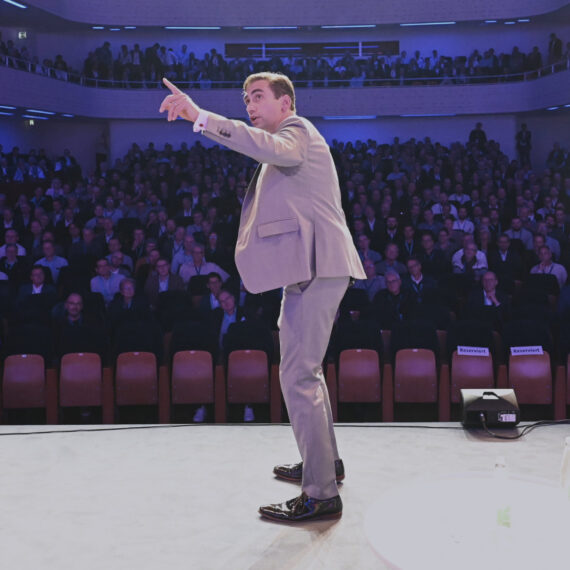How will CEOs work in 2030? Sven Gábor Jánszky heads 2b AHEAD, Europe’s largest trend research institute. At the Swisscom Business Days 2023, he spoke about what executives can expect in the near future and how they can best prepare for this – a brief perspective in four sections.
Prologue: What does a futurologist do?
‘To predict the future, you need to conduct analysis. We are not creatives or visionaries,’ says futurologist Sven Gábor Jánszky. As a scientist, he operates in the realm of the quantifiable. So what does a futurologist do? Using interviews, he finds out where and how the leading companies in a sector are investing, what will result from this over the next five to ten years and what impact this will have on developments in the world of work. ‘Futures studies are forecasts, there is no truth in futures research,’ says the expert.
ReThink workshop
In the ReThink workshop, you can determine your digital maturity and plan your digital journey.
Section 1: Vision of the future, not a plus and minus list
Managers generally use benchmarking – or, more simply put, a plus and minus list – to plan for the future. They analyse the status quo in respect of their own companies, then look at their competitors and conduct comprehensive industry analysis. Their focus is on market leaders. Finally, comparisons are made and the CEOs use the results as the basis for their decisions on measures targeting their respective company’s strengths and weaknesses.
‘When CEOs analyse the present, they automatically bypass the future.’
Sven Gábor Jánszky
This strategy may yield results. Then again, it may instead lead to a company being leapfrogged by its competitors. Fast-growing companies are the most valuable in the world, however their planning for the future is not based on analysis of the present – but a vision of what lies ahead: how will the world look in ten years’ time and what role should my company play in this? ‘Google didn’t say they were making a better lending system for libraries. They said they were re-sorting the world’s knowledge,’ says Sven Gábor Jánszky. ‘As a CEO, if you know what the future looks like, if you already have that forecast today, then you can also decide right now how to lead your company into the future.’
Section 2: Decision-making with AI
Technological developments have enabled many tasks to be carried out faster and cheaper over time. In some areas, manual labour has disappeared altogether. In 2030, CEOs will still have the last word in many companies, but most decisions will have already been analysed and recommended by an AI. ‘It remains exciting to see whether CEOs will have the courage to act contrary to the advice of an AI and what this will look like,’ says Sven Gábor Jánszky.
Survival of the most adaptive
With computing capacity growing exponentially due to quantum computers, AI will work even faster in the future. The aim is to achieve adaptivity, i.e. system adaptation to user preferences. Targeted ads on the internet, music recommendations based on personal playlists and smart homes are already well established today. In future, companies will not only know what interests people, but also use the data they collect to fulfil their wishes even before they are expressed. This, in turn, will have an impact on logistics and production.
Section 3: The metaverse as a meeting place
The metaverse will be one of the key technologies in 2030. All large companies will work with it and equip themselves with devices such as VR headsets and software for this. The metaverse creates a limitless virtual space by merging the virtual world, augmented reality and the physical world. ‘At meetings and events, we will sit around a table with colleagues or customers and engage with them as if they were physically present,’ explains Sven Gábor Jánszky. ‘All technical areas will continue to evolve, but the metaverse will be especially significant.’
Section 4: Mindset and employee management
‘Nothing can be achieved without a very concrete vision of the future,’ says Sven Gábor Jánszky. Managers not only need to know where their company will position itself in the future, but also communicate this goal to employees. As already mentioned in Section 1, this is based on a vision of the future, not a plus and minus list. Only around 15% of people around the world are intrinsically motivated and feel best when things change and the risk is tangible. The remaining 85% prefer stability. ‘The CEO’s job is to separate the 15 from the 85 and to create a protected space where these 15 can conduct experiments.’ These employees will determine the rules, speed and way of working. The only business requirement is the vision of the future.
And what will happen to the 85%? ‘Managers will have to prevent them from sticking to their old behaviour patterns,’ says Sven Gábor Jánszky. Specifically, if a process was previously documented on paper, companies should no longer provide paper for this purpose in the future. ‘We can’t put a brake on technology. As a CEO, you have to decide whether to just survive or shape the future.’
Epilogue: Three questions for Sven Gábor Jánszky
1. Do you ever feel like everything is going too slowly?
(smiles) The forecasts created through futures studies are on target. So, no. But when I look at the news of the day, I do indeed see a discrepancy between what is considered important now and where the future is headed.
2. What about ethics, morality and humanity?
(smiles a bit more) I’m paid for probabilities, not ethics. But if a humanoid robot can empty a dishwasher, then it’ll certainly be able to snuggle up at some point as well.
3. Will an AI make wage demands or request holidays at some point?
(laughs) Great question. Let’s put it this way: AI is constantly learning from humans. If you assume that consciousness has evolved biologically, then it could well be the case that an AI may eventually come up with crazy ideas about pay or holidays once it has collected enough information…
ReThink Workshop
Let’s ReThink – transformation means trust. In digitisation, in employees and in our own management. In the ReThink workshop with our experts, you will learn more about your digital maturity and the potential of your company.



